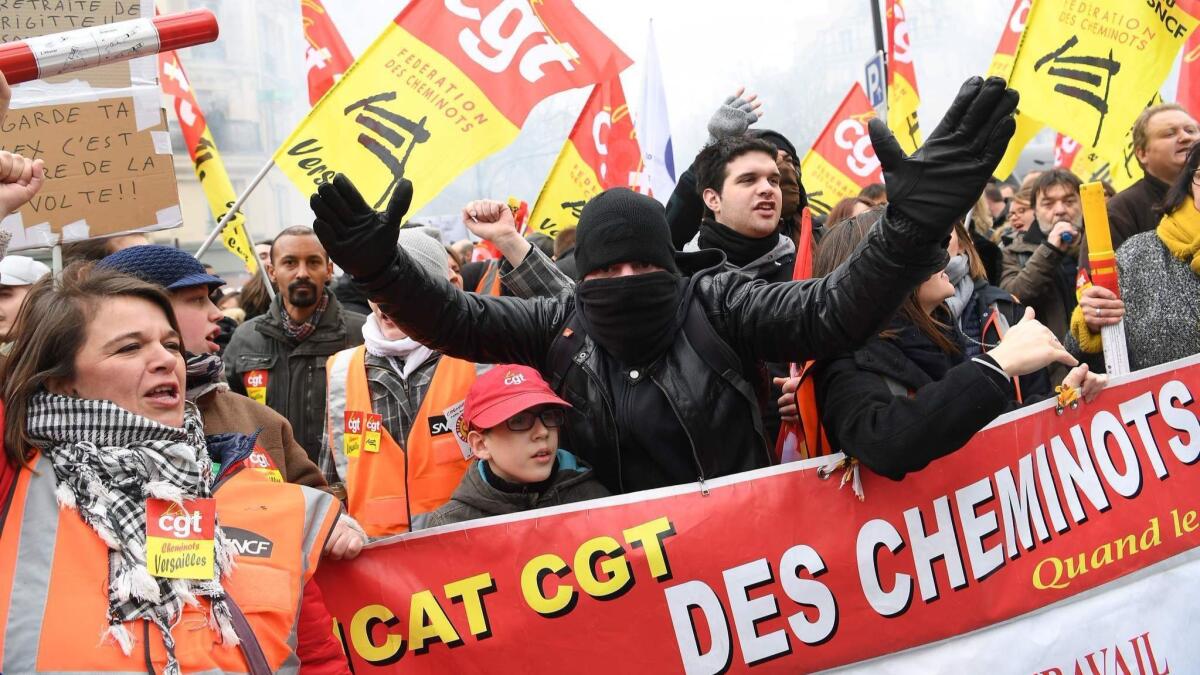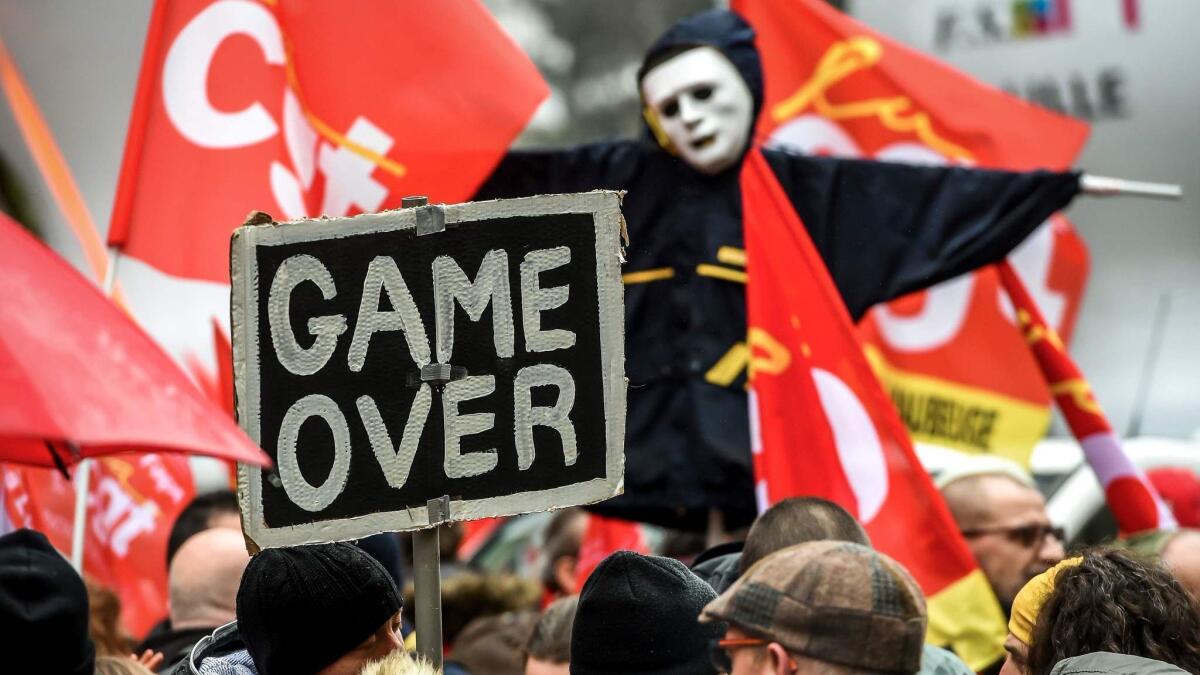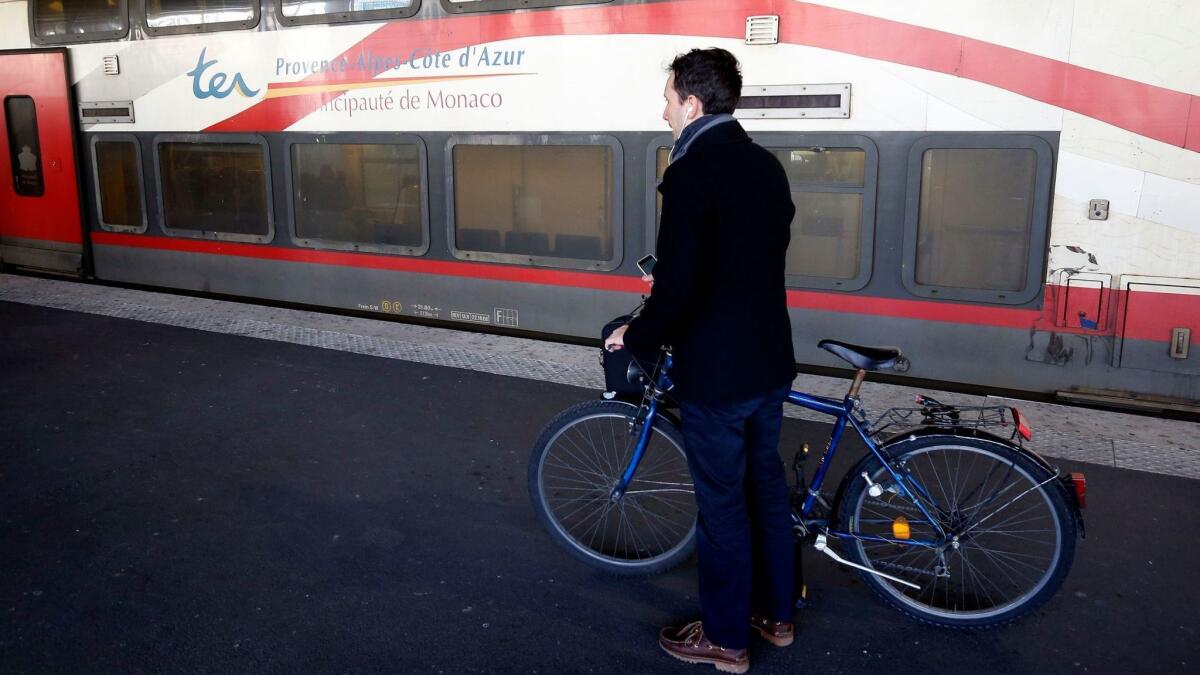Public employees strike in France, disrupting transit and challenging economic changes by President Macron

Thousands of people took to the streets of France on Thursday, disrupting transportation, schools and other public services in a defiant challenge to economic changes announced by President Emmanuel Macron.
Authorities said the mostly peaceful protests, organized by public service labor unions, caused severe traffic chaos across the country. Hundreds of trains were canceled and a walkout by air traffic controllers disrupted flights. There were a reported 186 miles of traffic jams around the French capital as commuters jumped into cars to get to work.
In Paris, police said vandalism by two groups of militants did not appear to be part of the demonstration by public service workers and their supporters. Some members of the groups had thrown stones and bottles at riot police, who responded with tear gas and water cannons, while others wielding iron bars and wooden sticks had smashed bus shelters and attacked several banks.
The nationwide series of strikes and protests signaled the first serious challenge to Macron since he came to power in May on a reform program. The centrist leader, who pledged to shake up his country’s labor laws, had faced limited opposition until he announced sweeping reforms to the vast state rail system, SNCF — the Societe Nationale des Chemins de Fer Francais — in February.
Macron says that modern rail workers are not required to perform the intense manual labor expected of their predecessors and that his reforms will apply only to new recruits.
His plans call for opening the rail system to private companies to reduce SNCF’s $57.4-billion debt, which is expected to increase by $3.7 billion a year. He also aims to reduce public spending with budget cuts, and decrease the number of public sector workers by 120,000 during his five-year term.
This is not the first time a French administration has attempted to reform the country’s debt-ridden railways, which were nationalized in August 1937. Rail workers enjoy enviable privileges including jobs for life, automatic annual pay raises, generous pensions and, for some, the right to retire a decade before most other workers.
But unions opposed to proposed labor changes have paralyzed parts of the country in past years. The rail unions have announced two-day rolling strikes every five days until the end of June, if necessary.
On Thursday, striking rail workers were joined by teachers, hospital staff, air traffic controllers, and other public workers who make up the 5.4-million-member state workforce.
All have individual reasons for protesting, but the overall grievance aired by all French unions is that Macron, a former investment banker, is bowing to capitalist and globalized interests in wanting to sell off state industries, remove worker rights and privileges and threaten job security.
Laurent Berger, head of the moderate French Democratic Confederation of Labor union, or CFDT, told French radio that the government had to listen to public sector workers.
“Either they listen or civil service workers will become extremely mobilized,” Berger told RTL.
A statement from the powerful and militant General Confederation of Labor, or CGT, said the day of action had been a success.
“Everyone who took part, as well as the strikers, have shown their attachment to public services,” it read.
“Contrary to the government’s choice of social regression, they have demanded that public services be further developed and given the necessary means to fulfill their role…. Deaf to the proposals from the world of work, the government has chosen social confrontation.”
The General Confederation of Labor called for another day of action on April 19.
During a visit to an agriculture fair last month, Macron spoke about his grandfather Andre Macron, an SNCF worker in Somme, in northern France, after being challenged by a rail employee.
“I’m the grandson of a railway worker, go see the farmers, they have no special status … it’s no use kidding people,” Macron told the man, adding: “What age are you? You’re not having to work at the same rhythm as my grandfather who was a rail worker.”
In February, Prime Minister Edouard Philippe warned that the government intended to push through the rail reforms by special decree, avoiding a parliamentary vote, if necessary.
Transport Minister Elisabeth Borne told French television last week that she was prepared to negotiate with the rail unions, but called the strikes “irresponsible” and said reform was essential.
“The government is not looking for a showdown … there are things we are prepared to discuss,” she told CNewsTV on Friday.
In an interview the previous day, Borne had justfied the government’s proposals.
“This is a necessary, indispensable reform. My hope is not for a test of strength; my hope is for negotiations,” she said.


Willsher is a special correspondent.
UPDATES:
3:45 p.m.: This article was updated throughout with Times reporting.
This article was originally published at 11:15 a.m.
More to Read
Start your day right
Sign up for Essential California for news, features and recommendations from the L.A. Times and beyond in your inbox six days a week.
You may occasionally receive promotional content from the Los Angeles Times.






